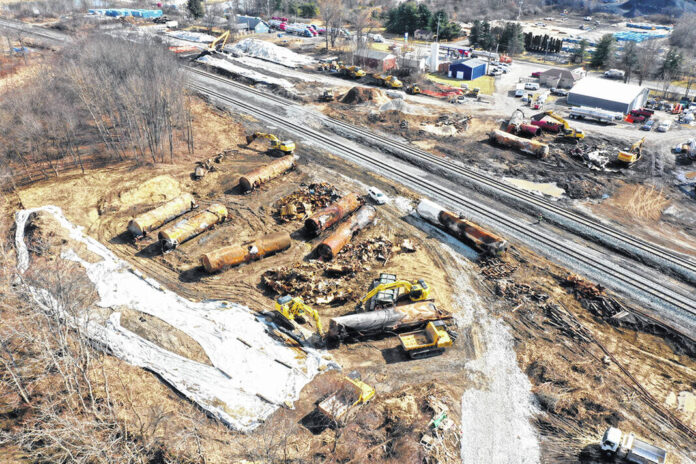WASHINGTON, D. C. – U.S. House of Representatives members who represent areas near the site of a train derailment in East Palestine, Ohio, introduced bipartisan rail safety legislation on Friday that they hope will diminish the threat of future derailments.
The Reducing Accidents in Locomotives (RAIL) Act that U.S. Rep. Bill Johnson, a Marietta Republican, introduced with U.S. Rep. Emilia Strong Sykes, an Akron Democrat, would audit federal rail inspection programs, increase maximum penalties for rail safety regulation violations, increase funding for first responders’ hazardous materials training and increase inspections on all trains, including those carrying hazardous materials.
It would also direct the Federal Rail Administration (FRA), in conjunction with the findings of an ongoing National Transportation Safety Board (NTSB) investigation, to recommend changes to how our nation’s rail system operates – from train length, weight to speed, and track standards.
The Feb. 3 Norfolk Southern derailment in East Palestine spilled toxic chemicals such as vinyl chloride, butyl acrylate, ethylhexyl acrylate, and ethylene glycol monobutyl ether. Federal and state officials, fearing the vinyl chloride tanks would explode, set them afire, creating a massive plume of thick black smoke. Other chemicals seeped into local streams, killing fish and traveling down into the Ohio River.
Johnson, whose district includes East Palestine, said the derailment “upended the lives of those living in East Palestine and the surrounding region,” and highlighted the importance of swift congressional action to strengthen rail safety standards, “prevent railway accidents and keep communities across America safe.”
A statement from Sykes said the legislation’s passage would hold railroad companies accountable and “ensure that no American living close to our 140,000 miles of railroad track has to worry about the threat of a toxic derailment in their backyard.
“This is a good first step towards better rail infrastructure, but we know there is still more to be done to protect our communities,” said Sykes.
The legislation is co-sponsored by all of Ohio’s Democratic U.S. House of Representatives members, as well as Republicans Max Miller of Rocky River, Dave Joyce of South Russell, Mike Turner of Dayton, Troy Balderson of Zanesville, and Mike Carey of Columbus.
Johnson and Sykes said 281 train accidents occurred in Ohio from 2019 through November 2022, and has one of the highest rates of serious train accidents and hazardous materials spills of any state.
Ohio’s U.S. Senators have introduced separate legislation to address the derailment. The bill they drafted with their Pennsylvania counterparts would require well-trained, two-person crews aboard every train, substantially increase maximum fines the U.S. Department of Transportation can issue for safety violations, and expand HAZMAT training grants for local first responders by increasing fees assessed to railroads.
The bipartisan “Railway Safety Act of 2023″ also would create new safety requirements and procedures for trains carrying hazardous materials like the vinyl chloride released in East Palestine, such as requiring rail carriers to provide advance notification and information to state emergency response officials about what they are transporting, setting rules for train size and weight and imposing requirements to prevent blocked rail crossings.
A spokesman for Johnson said the House bill has similar goals to the Senate bill, but has several differences that include omitting the two-person crew requirement and asking the Federal Railroad Administration to recommend safety changes instead of giving broad authority to the U.S. Department of Transportation.
Democratic U.S. Sen. Sherrod Brown of Cleveland on Thursday joined with both of Pennsylvania’s U.S. Senators to introduce separate legislation called the “Assistance for Local Heroes During Train Crises Act” that would create a new fund, paid for by companies that ship and carry materials via railroad, that would be used to reimburse local first responders for expenses they accrue when train derailments occur.
The state of Ohio filed a lawsuit against Norfolk Southern on Tuesday, alleging that it violated numerous state and federal laws, including Ohio’s solid waste, air pollution, water pollution, and hazardous waste laws.







